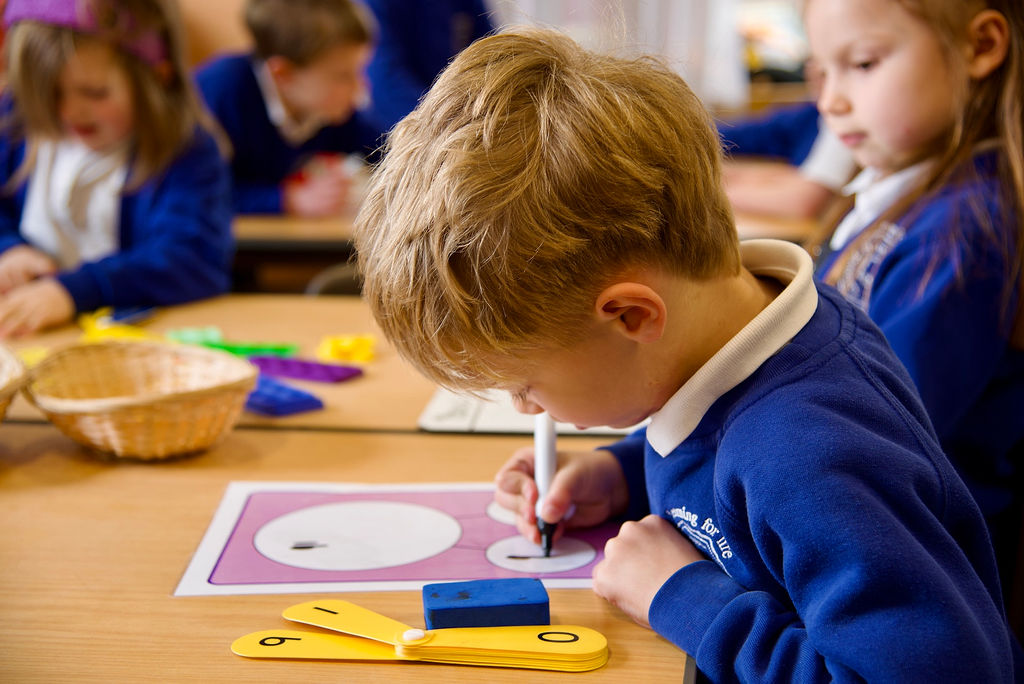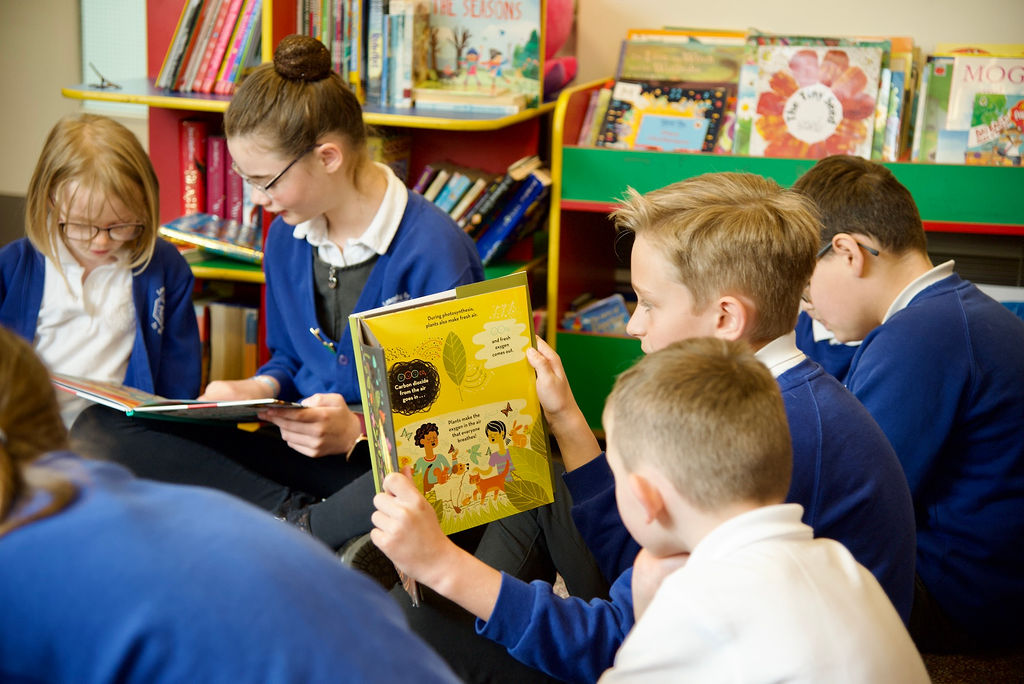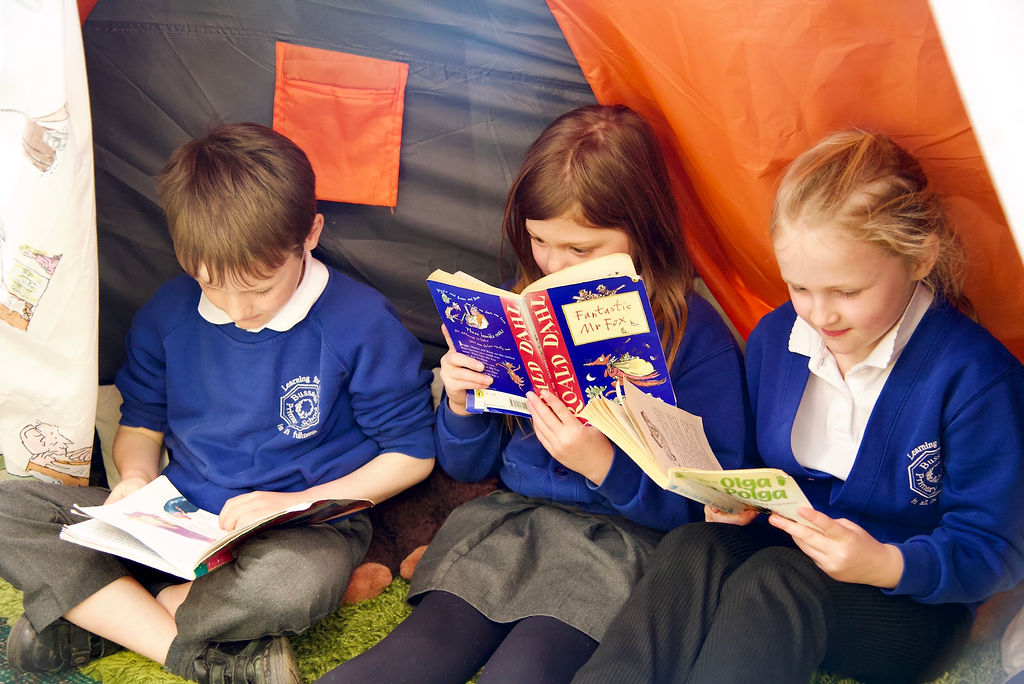English
From the earliest moments in school, children are taught to crack the alphabetical code so they can read with fluency.
Ofsted October 2022
Phonics & Spelling
Phonics, which is the teaching of all the letters and ‘sounds’ in our language, is given a very high priority at Bussage Primary School. It is essential for children to learn through phonics teaching as it enables them to become successful readers and spellers – essential skills across the curriculum!
Phonics is taught discreetly, five days a week for approximately twenty minutes at a time. This means we have separate sessions, dedicated solely to the teaching and learning of sounds and letters.
We introduce phonics right at the start of Reception and, in Reception and Year 1, we follow the DfE validated ‘Essential Letters and Sounds’ (ELS) programme. The programme teaches children to read by identify the phonemes (smallest unit of sound) and graphemes (written version of the sound) within words and using these to read words. Children experience the joy of books and language whilst rapidly acquiring the skills they need to become fluent independent readers and writers.

We use a simple, consistent approach to teaching phonics. The children will experience the same classroom routines within each lesson which reduces cognitive load and maximises the chances of success. All children are supported within the lesson to use their new phonic knowledge independently. In every single ELS lesson, children will make the direct application to reading. Lots of opportunities are provided for oral blending, eg, c/oa/t The main focus is on word recognition. However, new vocabulary is also given and explained in every lesson. Opportunities are also given for writing new graphemes, words and sentences.
To fully support their phonics learning, children are only expected to independently read from books that are entirely decodable. We only use pure sounds when decoding words (no ‘uh’ after the sound). We encourage children to practise reading their books at home 4 times across the week working on these skills: decoding, fluency and expression. We assess the children regularly (at least once a half term) on their progress and use this information to identify any gaps in learning. Children will then be targeted with extra revision and practice of any identified gaps in sound knowledge and blending and, where appropriate, take part in specific interventions to ensure any gaps are closed rapidly.
Pupils in Year 2 onwards, who do not yet have a fully secure phonic knowledge, will be further supported through specifically targeted support in class and through interventions to ensure that every child is able to read fluently before they leave primary school.
Reading
At Bussage we aim for all our pupils to become confident, fluent readers who are passionate about reading.
Learning to read is one of the most important things your child will learn at our school. We want your child to love reading and books, and develop an authentic love of reading for pleasure. This is why we put our efforts into making sure they develop a love and curiosity about books as well as simply learning to read.
We believe that a reading child is a successful child and that:
- Children deserve a rich curriculum which encourages extensive reading of books and other kinds of texts;
- Planning enables links across learning, which create a wide range of opportunities in which children can read for pleasure;
- Children will have the opportunity to experience whole books to support them in their understanding of literary structures and allow them to become absorbed in the story itself (this includes class reads where the adult in class regularly reads to the
children); - The active encouragement of reading for pleasure should be a core part of every child’s educational entitlement, whatever their background or attainment. Extensive reading and exposure to a wide range of texts make a huge contribution to students’ educational achievement;
- All children should have access to a wide range of texts in different formats and genres and support in enjoying them where necessary;
- The school will engage and support parents enabling access to a full range of reading experiences;
- Home-school relationships will promote the importance of all adults in fostering a love of reading;
- School reading should not only be seen as synonymous with attainment and judgement as this could influence children’s perceptions of books and reading;
- Staff should demonstrate and model their own love of reading to the children, by reading to the class in an engaging way and promoting their own reading interests by, for example, displaying posters of their preferences around school;
- Children are given opportunities to celebrate reading. For example, by participating in exciting activities for World Book Day every year.

We teach Reading in a variety of ways.
Pupils are given the opportunity to undertake guided, shared and
independent reading throughout the school curriculum. We work with
our pupils in order to improve their fluency, intonation, decoding
skills and comprehension.
To develop our readers we:
- Teach them to read accurately and fluently using a range of strategies;
- Help them to understand and respond to what they read using inference and deduction where appropriate;
- Allow the opportunity for pupils to reflect on and discuss what they have read, including the language and punctuation choices made by the author;
- Enhance their understanding of a variety of text types including non-fiction, fiction and poetry;
- Encourage them to develop a love of reading and become confident, fluent and independent;
- Teach them how to seek information and learn from the written word;
- Teach pupils how to decode using phonics activities from Early Years Foundation stage;
- Use the Essential Letters and Sounds programme on a daily basis in Reception and Year 1 to develop fluency and accuracy in word and sentence reading (more details in the ‘Phonics at Bussage’ document).
- Teach guided reading groups throughout EYFS, KS1 and Year 3 at least three times a week.
- Teach whole class guided reading lessons in Years 4 to 6.
- Teach weekly written comprehension lessons from Year 1 up to Year 6.
- Have a ‘Word of the Day’ every day throughout the school, which exposes children to a wide range of new and ambitious vocabulary which then aids their understanding of texts when reading.
We use a range of books to encourage and teach reading.
Every classroom has its own wide range of books, available for the use of the children and adults. We have a fantastic school library, with a great selection of books, across all areas of interest.
We use a ‘book banding’ system throughout the school, for individual reading, guided reading and reading at home. This is to ensure the children are reading books which are an appropriate challenge to them.
Children in EYFS and Year 1, and pupils in other year groups who are continuing to develop their phonic knowledge and understanding, read books that are fully decodable and are matched to the sounds they are learning in their phonics lessons. They also have the opportunity to read ‘Richer Read’ books, which are meant to be ‘shared’ with an adult at home as they are not fully decodable but allow the children to experience a wide variety of texts and a wide range of new and ambitious vocabulary.

The children are assessed on a regular basis, using a variety of methods. The children will then have access to books, and activities in class, that reflect their individual needs.
Following the following links to find out which books are recommended reads for each year group:
EYFS (Rainbows) recommended reads
Year 3 recommended readsYear 4 recommended readsYear 5 recommended readsYear 6 recommended readsFor our more advanced readers - Year 7 recommended reads




